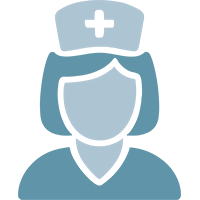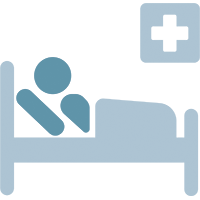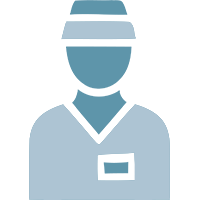Patient Services
The benefit of hospice care is achieved when services can be initiated early enough to receive maximum support. When a referral is made to hospice, a team of qualified professionals will oversee the patient’s plan of care.
The Interdisciplinary Team consists of the following:
 Physician
The Hospice Medical Directors are responsible for developing a comprehensive medical care plan for each patient and ensuring that every member of the hospice team, caregivers, and the patient’s family, are knowledgeable of the care plan.
Physician
The Hospice Medical Directors are responsible for developing a comprehensive medical care plan for each patient and ensuring that every member of the hospice team, caregivers, and the patient’s family, are knowledgeable of the care plan.
 Registered Nurse
The Hospice Nurses provide expert pain management and symptom control along with compassionate listening and counsel. They make several visits weekly to ensure that the patient’s goal of care is being met. Hospice and nurses promote the highest quality of life for the patient and family and are available 24/7 to help achieve this.
Registered Nurse
The Hospice Nurses provide expert pain management and symptom control along with compassionate listening and counsel. They make several visits weekly to ensure that the patient’s goal of care is being met. Hospice and nurses promote the highest quality of life for the patient and family and are available 24/7 to help achieve this.
 Social Worker
The Hospice Social Workers are available to help patients and their loved ones or caregivers navigate the practical and emotional issues that arise during the end-of-life journey. They can assist with things like respite care, advance directives and funeral arrangements, to name a few.
Social Worker
The Hospice Social Workers are available to help patients and their loved ones or caregivers navigate the practical and emotional issues that arise during the end-of-life journey. They can assist with things like respite care, advance directives and funeral arrangements, to name a few.
 Chaplain
The Hospice Chaplains provide expert spiritual care and counseling. Regardless of religion, creed or culture, a Chaplain is available to help work through and manage the complex emotions people face at the end of life.
Chaplain
The Hospice Chaplains provide expert spiritual care and counseling. Regardless of religion, creed or culture, a Chaplain is available to help work through and manage the complex emotions people face at the end of life.
 Bereavement Coordinator
The Bereavement Coordinator provides grief support services before and after a patient’s death.
Bereavement Coordinator
The Bereavement Coordinator provides grief support services before and after a patient’s death.
 Hospice Aide
The Hospice Aides assist a patient’s family member in caring for their terminally ill loved one by instructing them on how to go about performing basic healthcare routines. They are available to our patients several times a week to help with bathing, grooming, changing bed linens and more.
Hospice Aide
The Hospice Aides assist a patient’s family member in caring for their terminally ill loved one by instructing them on how to go about performing basic healthcare routines. They are available to our patients several times a week to help with bathing, grooming, changing bed linens and more.
 Dietary Counseling
Our hospice nurses assess patients’ nutritional needs and provide nutritional counseling to help manage symptoms such as constipation and other side effects related to medication and treatment.
Dietary Counseling
Our hospice nurses assess patients’ nutritional needs and provide nutritional counseling to help manage symptoms such as constipation and other side effects related to medication and treatment.
 Volunteers
Hospice Volunteers provide many services for our patients and our hospice program. Some of the opportunities include visiting with patients and families, assisting with clerical work in the office, and providing therapeutic pet and music visits.
Volunteers
Hospice Volunteers provide many services for our patients and our hospice program. Some of the opportunities include visiting with patients and families, assisting with clerical work in the office, and providing therapeutic pet and music visits.
The Interdisciplinary Team consists of the following:
 Physician
The Hospice Medical Directors are responsible for developing a comprehensive medical care plan for each patient and ensuring that every member of the hospice team, caregivers, and the patient’s family, are knowledgeable of the care plan.
Physician
The Hospice Medical Directors are responsible for developing a comprehensive medical care plan for each patient and ensuring that every member of the hospice team, caregivers, and the patient’s family, are knowledgeable of the care plan.
 Registered Nurse
The Hospice Nurses provide expert pain management and symptom control along with compassionate listening and counsel. They make several visits weekly to ensure that the patient’s goal of care is being met. Hospice and nurses promote the highest quality of life for the patient and family and are available 24/7 to help achieve this.
Registered Nurse
The Hospice Nurses provide expert pain management and symptom control along with compassionate listening and counsel. They make several visits weekly to ensure that the patient’s goal of care is being met. Hospice and nurses promote the highest quality of life for the patient and family and are available 24/7 to help achieve this.
 Social Worker
The Hospice Social Workers are available to help patients and their loved ones or caregivers navigate the practical and emotional issues that arise during the end-of-life journey. They can assist with things like respite care, advance directives and funeral arrangements, to name a few.
Social Worker
The Hospice Social Workers are available to help patients and their loved ones or caregivers navigate the practical and emotional issues that arise during the end-of-life journey. They can assist with things like respite care, advance directives and funeral arrangements, to name a few.
 Chaplain
The Hospice Chaplains provide expert spiritual care and counseling. Regardless of religion, creed or culture, a Chaplain is available to help work through and manage the complex emotions people face at the end of life.
Chaplain
The Hospice Chaplains provide expert spiritual care and counseling. Regardless of religion, creed or culture, a Chaplain is available to help work through and manage the complex emotions people face at the end of life.
 Bereavement Coordinator
The Bereavement Coordinator provides grief support services before and after a patient’s death.
Bereavement Coordinator
The Bereavement Coordinator provides grief support services before and after a patient’s death.
 Hospice Aide
The Hospice Aides assist a patient’s family member in caring for their terminally ill loved one by instructing them on how to go about performing basic healthcare routines. They are available to our patients several times a week to help with bathing, grooming, changing bed linens and more.
Hospice Aide
The Hospice Aides assist a patient’s family member in caring for their terminally ill loved one by instructing them on how to go about performing basic healthcare routines. They are available to our patients several times a week to help with bathing, grooming, changing bed linens and more.
 Dietary Counseling
Our hospice nurses assess patients’ nutritional needs and provide nutritional counseling to help manage symptoms such as constipation and other side effects related to medication and treatment.
Dietary Counseling
Our hospice nurses assess patients’ nutritional needs and provide nutritional counseling to help manage symptoms such as constipation and other side effects related to medication and treatment.
 Volunteers
Hospice Volunteers provide many services for our patients and our hospice program. Some of the opportunities include visiting with patients and families, assisting with clerical work in the office, and providing therapeutic pet and music visits.
Volunteers
Hospice Volunteers provide many services for our patients and our hospice program. Some of the opportunities include visiting with patients and families, assisting with clerical work in the office, and providing therapeutic pet and music visits.
Massage Therapy
Our licensed massage therapists are trained in techniques specially suited for hospice care—always prioritizing safety, sensitivity, and each patient’s unique needs. Whether it’s a light touch for comfort or targeted relief for muscle tension, massage can bring a moment of peace and human connection when it matters most.
Benefits of Massage Therapy in Hospice Care:
- Relieves physical discomfort and tension
- Supports emotional well-being
- Enhances circulation and sleep quality
- Promotes a sense of calm and connection
If you’d like to learn more about this service, we’re here to answer your questions.
How Do I Start Hospice Care?
Four levels of care
 Routine Home Care
This is how we provide hospice care most often: in patients’ homes, long-term care facilities and nursing homes.
Routine Home Care
This is how we provide hospice care most often: in patients’ homes, long-term care facilities and nursing homes.
 Continuous care
When medically necessary, acute symptom management is provided at home or in another facility by hospice staff in shifts of up to 24 hours/day so the patient can avoid hospitalization.
Continuous care
When medically necessary, acute symptom management is provided at home or in another facility by hospice staff in shifts of up to 24 hours/day so the patient can avoid hospitalization.
 Inpatient Care
If a patient’s needs cannot be managed at home, special arrangements at other local facilities provide hospice care around the clock until the patient can return home.
Inpatient Care
If a patient’s needs cannot be managed at home, special arrangements at other local facilities provide hospice care around the clock until the patient can return home.
 Respite Care
Limited to up to five consecutive days, respite care provides a brief “respite” for the patient’s primary caregiver by admitting the homecare patient to a nursing facility without having to meet the “inpatient” pain and symptom management criteria.
Respite Care
Limited to up to five consecutive days, respite care provides a brief “respite” for the patient’s primary caregiver by admitting the homecare patient to a nursing facility without having to meet the “inpatient” pain and symptom management criteria.
